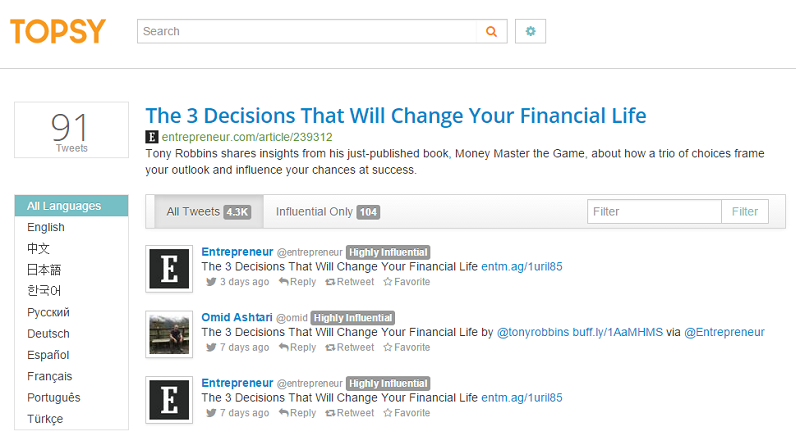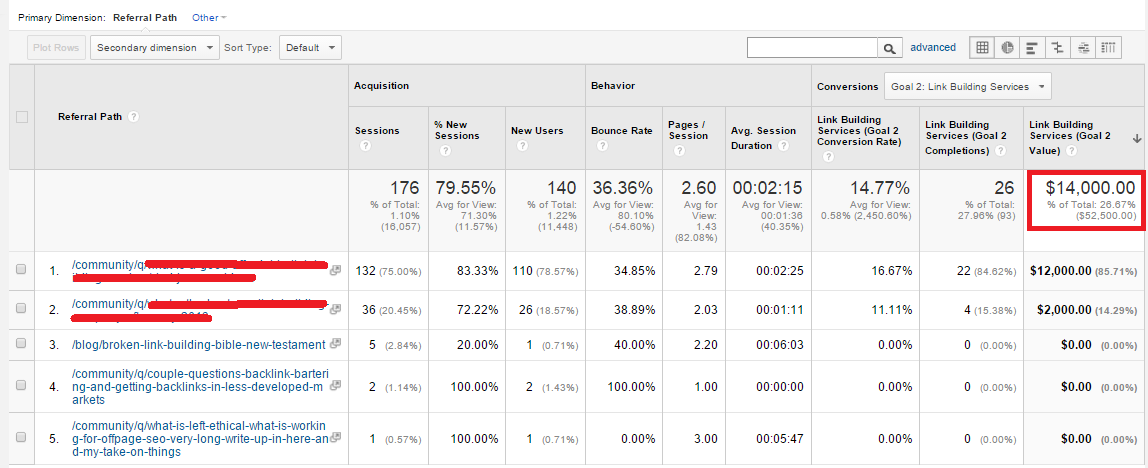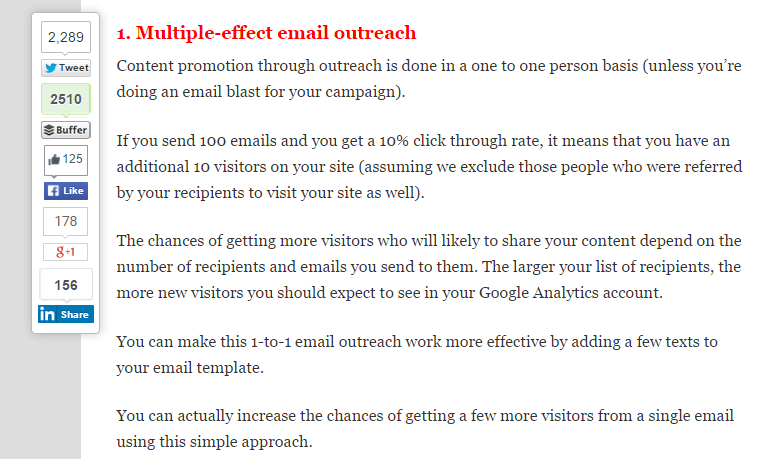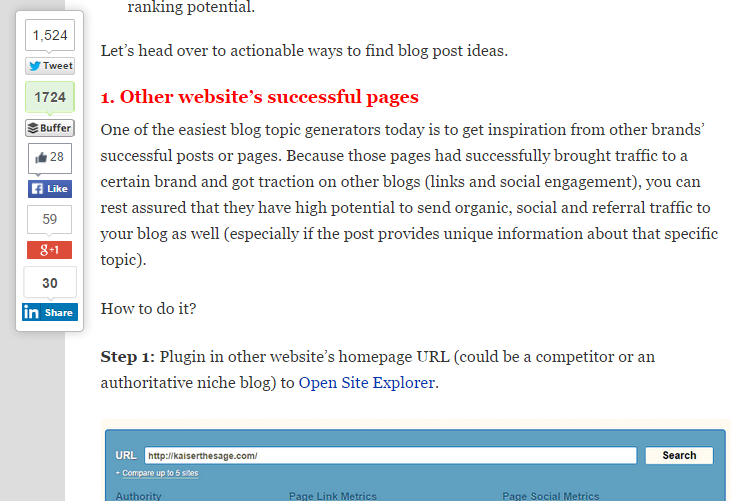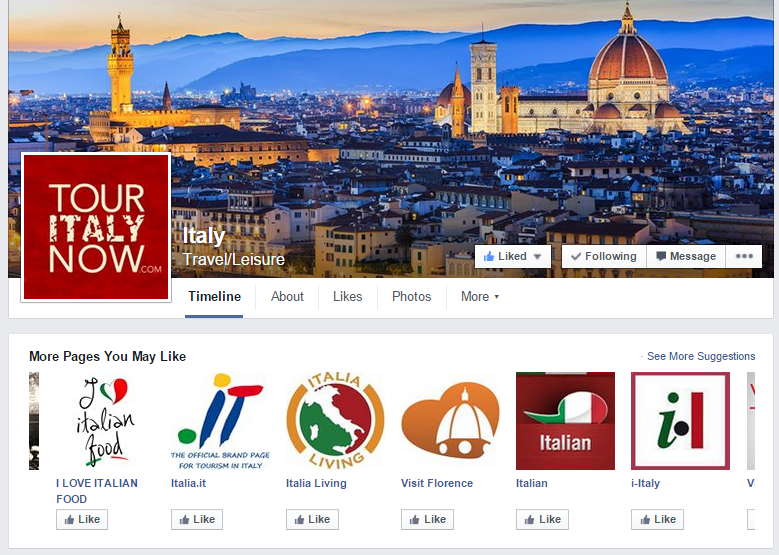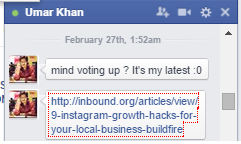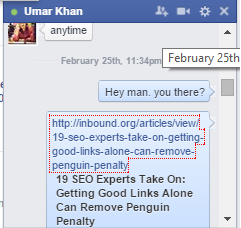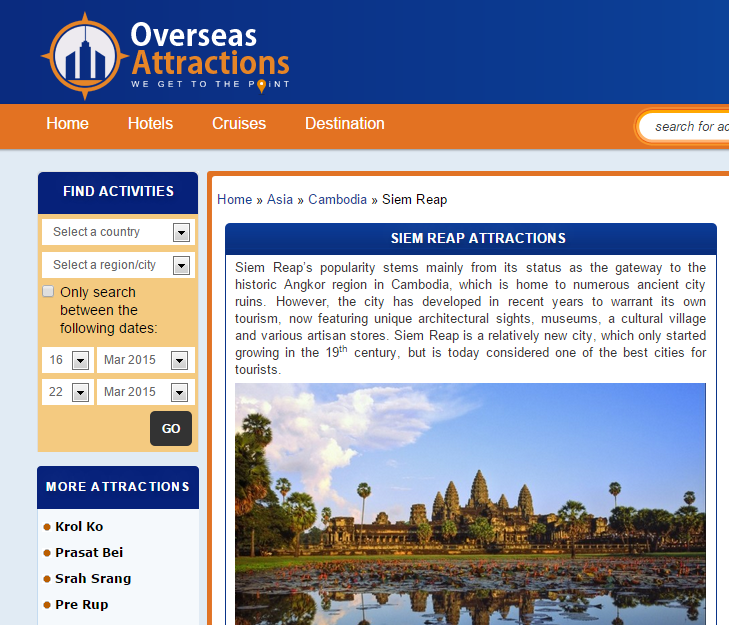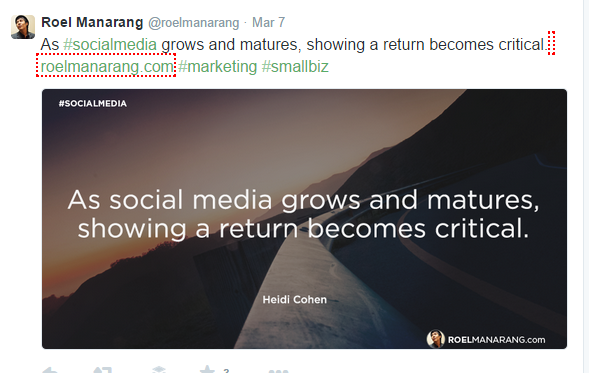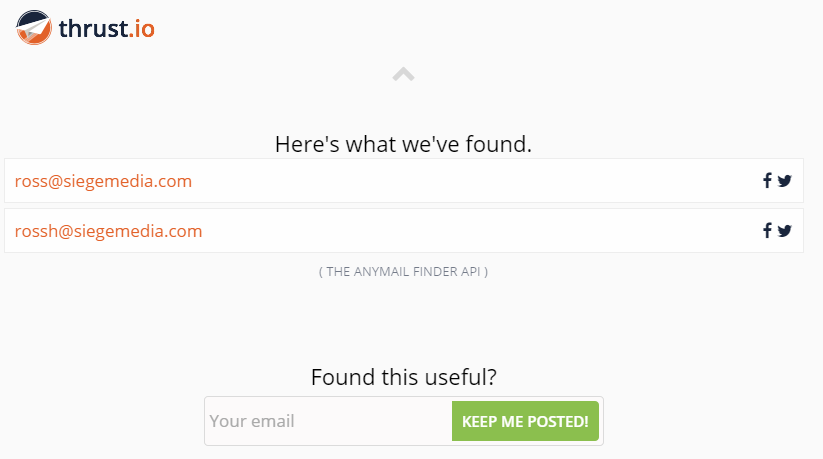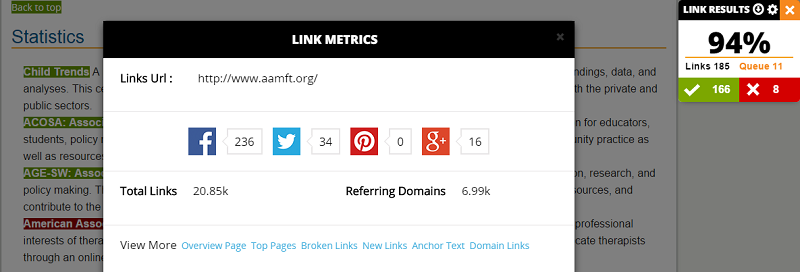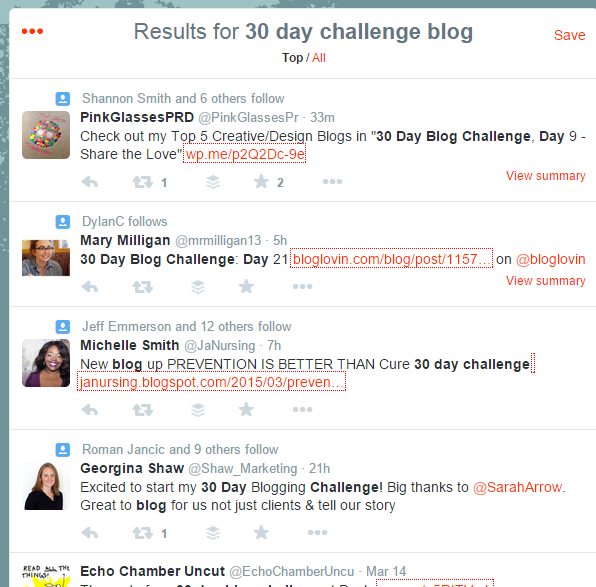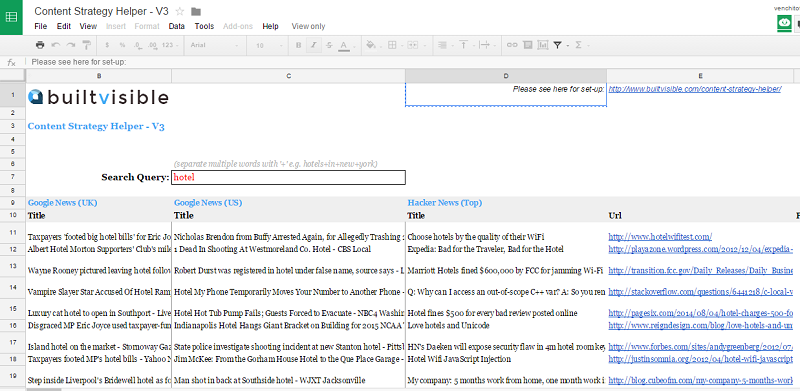by Venchito Tampon Jr | Last Updated on June 26, 2023
Traffic is the lifeblood of every website because this is where most business owners and bloggers depend their monthly online sales.
Since the more traffic you can generate on a regular basis, the likelihood of earning more profit is higher.
This is why there are tons of articles that brought up this topic – traffic generation – for the past several years and I’m constantly been seeing posts every week – where some of them are just duplicates of ideas shared on other blogs.
In this post, I’ll be sharing 15 effective strategies that will help you increase your blog traffic.
1. Earn non-paid social traffic from influencers
Nudging influencers to read your post and get them shared on social won’t be too easy if there is no initial analysis on the viral potential of your topic.
Most of the time, influencers don’t just share posts because they have resonated with the quality of the content. Instead, they saw their colleagues (fellow influencers) sharing one article on social platforms.
With that, you have to consider the number of influencers who have shared trending articles on social – as a determining factor of choosing that same topic for your next blog post.
For instance, if you are looking for trending finance articles in Buzzsumo, you will end up finding this post as the top content for the keyword – finance.
[entrepreneur-financial-decisions]
You should get away with that gigantic number of social shares, simply because authority blogs like Entrepreneur.com always have thousands of social shares for each of their articles regardless of the quality of the content produced.
Instead, use another tool – Topsy to determine the number of influencers who’ve shared that post.
Use the same process for all ranking posts in Buzzsumo and consider that data (post –shared by # of influencers) to decide which topics/themes you’ll use for your next content (obviously, you’ll choose ones with the highest number of shares from influencers).
2. Build links from third party listings with high business value
Reviews from third-party sites always impact the business in terms of branding, value, vote of confidence and potential generation of leads.
For the past few months, my business has been acquiring several potential clients from a single referring web-based product site. And the most surprising part is that those 2 referring threads in one same website generated $14,000 worth of services to my business (one client – minimum of $500 conversion).
This strategy is not solely applicable to internet marketing related industries, but for any type of niche, you’ll see tens even hundreds of websites that can bring potential industry customers/clients to your business.
If you’re existing for years, then go to your Google Analytics account and list down in a spreadsheet all referring sites/pages that brought conversion value to your company (make sure you’ve setup your conversion goals correctly).
If you’re new in the industry, find domains that have high referring potentials using Google search (inurl:forum “very specific industry” – for dental clinics, you can use inurl:forum OR “business listing” “teeth).
Nudge your existing customers (with high votes of confidence to your products/services) to business listings and let them write reviews about your offerings.
3. Pull up unexpected hooks in your content
If you’ve heard psychological triggers (which are clearly explained by Brian Dean in his recent post), utility is one of the topmost considerations when writing a post, primarily because practical tips (how to’s) are very easy to learn and apply. In turn, readers would instantly share it to their peers once they’ve found it useful.
One way to strengthen utility in your post is to pull up unexpected hooks in your content.
Unexpected hooks are basically tips that are very unique in information that almost surpass the quality of other tips listed in the content. So when you pull these tips up in your page, readers can easily notice them and they’ll be triggered to share the post after reading it (“aha” or “wow” moments).
Below are some examples of tips that I pulled up in my previous blog posts since I’ve found them very unique in nature and could actually nudge readers to share or even link to them from their future content pieces.
4. Create non-branded Facebook pages
I’ve found this effective traffic generation strategy on my friend’s post which is basically creating Facebook pages that are not entitled with company names/services/products but instead labeled with simple non-commercial words/themes.
As you can see, below is an example of a Facebook page (Italy) that are not branded with a company name (except for the profile picture)
When you use Facebook OpenGraph and search for the keyword, “Italy”, you’ll see the page ranking in the search result.
The Italy page now has 66,000+ Facebook likes and will consistently earn new likes each week probably because of its ranking position and affinity potential of fans who’d have shared the page on their accounts (multiplier effect).
Creating a non-branded page for your company targeting a specific industry would greatly impact your site’s social traffic every single month, since the more users finding your page through amplification/sharing and search, the more traffic you’ll be generating through simple act of sharing your new content assets.
5. Prioritize retention for low cost Facebook advertising
With Facebook advertising, the more targeted your ads are, the higher returns you’ll get from it.
My friend, Roel Manarang personally shared a very interesting case study on how a $1-$3 USD per day spent on Facebook advertising can help generate 540 email subscribers for the website and 8000 USD more sales for the business (an increase of 40%).
The strategy is primarily focused on retention – those visitors/users who’ve engaged on the website through reading, subscribing and/or sharing posts on social platforms.
Instead of targeting new users that have low potentials of converting to a brand advocate/avid reader, the ads are targeted to already engaged users. This helps the campaign to become more effective since it actually triggers fans to become sharers of content and avid readers of the blog.
Two things that Roel is focusing on in his Facebook advertising campaign:
- Facebook Page Likes – Remarketing, $1-$2 USD per day (targeting people who visited the website).
- Facebook Engagement – Sponsored Story, $1USD (targeting people who already like the page or existing fans).
Try out this strategy for your blog and let me know in the comments section how effective it is in driving website visits/traffic, social followers and email subscribers.
Other useful resources:
6. Build an alliance for initial boost of traffic
Community sites such as Inbound.org have upvote systems that encourage people to engage simply by clicking up and down buttons on posts that had been shared.
Most of these sites consider the recency of sharing one specific post and # of votes given within hours after sharing, which boils down to one principle – the faster your post receive the highest number of votes, the easier it will rank in the list.
Having an initial set of votes to your post could trigger the system to rank it and in turn, bring significant amount of traffic to your page.
One strategy that you can use is building an alliance of engaged users within a specific community site – this will take a lot of effort in exchange for a consistent traffic generation.
I had an alliance with a few Inbound users that always upvote my posts when they were shared on Inbound.
This activity gives early boost of rankings to my posts and eventually helps my page earn its early referral traffic.
Every month, my site gets around 800 to 1500 from Inbound.org, which is a very good investment for a 5 minute traffic generation technique.
7. Use freely advertised pages for linker outreach
The value of outreach is becoming more saturated these days as more link developers/content marketers use it for one side benefit – sharing one content asset to a potential linker with the aim of acquiring a single link from the site’s resource/business listing page.
This often times result to lower responses and number of links from other relevant blogs/sites.
The most effective way to add value for both ends is to initiate creating content designed for other company pages or corporate sites.
To give you an example, we had a client who owns a tour deals website (travel niche), where its pages are mainly attractions and tours and have had lots of deals/discounts to give away to visitors.
Instead of reaching out to potential linkers and requesting for contextual links in their resource pages and business listings, we’ve decided to take a different proposition for outreach – prioritize hotel websites that have freely advertise pages published on the site.
Since we’ve given value first – creating a promotional page for them, there is a high likelihood that they’ll be returning the value – backlink.
8. Facebook comments on posts using branded pages
Facebook engagement is a no-brainer strategy to brand yourself in your target community.
However, most Facebook interactions still lack in one technique – using branded pages when commenting on other relevant pages.
This might not only add potential likes to your Facebook page but in turn, attract visitors/readers to your website as you can reference your post/page when interacting on relevant questions/discussions.
9. Post relevant Tweet quotes
Quotes are short and valuable easy-to-apply tips that can be spread widely in the social community.
With proper branding, posting quotes on Twitter would be an effective way to drive visitors to your target page (homepage or email capturing page).
Roel Manarang has been consistently posting Twitter quotes for the past several months, which are all relevant to his target community (marketing, startup and entrepreneurship).
As a result, his personal blog is attracting social signals as referral visits from social (Twitter).
10. Use email guessing to improve conversion rate
One barrier that gets outreach less and less effective for some brands is the improper guessing of personal/corporate emails of potential linkers.
Emails get stuck to wrong places when email addresses don’t fit to the right people – which will often result to lower responses and conversions (links).
One proper solution for this problem is the use of email guessing tools such as Thrust and VoilaNorbert.
Simply put the person’s name and his/her domain name then click the green button to trigger the system to find appropriate email addresses for you. Back it up with Rapportive to confirm the right address.
11. Weigh opportunities with LinkMiner
LinkMiner is the newest chrome extension tool developed by Jon Cooper of PointblankSEO and has the following powerful features:
- Check header response codes of pages faster than Check My Links
- Quickly see metrics of a specific page (e.g. you’ll see the # of referring domains for a 404 page).
- Export external links in a page with corresponding metrics, which are very useful in identifying which broken page has the highest number of referring domains.
Weighing link opportunities is one of the best things you can do with LinkMiner.
After exporting the list of external links, you can now sort them by highest to lowest referring domains to find broken pages that have high potential link sources.
This will validate your content as you can secure beforehand an approximate number of links you’ll earn from a broken link building approach.
12. Try out 30-day blogging challenge
There has been a trending strategy in the blogosphere nowadays – 30 day blogging challenge.
As the phrase implies, the blog will have to publish new blog post every single day for 30 days.
You have to test out the strategy throughout the month and analyze the results at the end of it – in terms of traffic, email subscribers and/or social signals.
This strategy would be possible for your blog by following these actionable tips:
- Create an editorial calendar to confirm available resources and ensure consistency throughout the campaign.
- Set goals for the whole campaign to motivate yourself and other blog writers (if you have multiple contributors) to provide the best quality of information in each and every article they publish (goals could be percentage of traffic increase and/or increase in email subscribers).
- Ask other guest bloggers from relevant websites to write for your blog. Make sure you emphasize some incentives in order to sustain the quality of each blog post (incentives like brand exposure, getting exclusive access to premium products/services, additional email subscribers, direct lead generation, etc..).
- Test other content formats to cope up with blogging frequency (i.e. videos and podcasts/audios).
Test out this strategy for your blog and see how it can gradually impact your blog traffic.
13. Reference older posts from industry engagements
Industry engagements are good branding strategy for newly established blogs especially if the engaged website has thousands of users that can potentially be targeted for sales.
Referencing older posts from community discussions/threads is one of the common techniques to engage yourself with other community users and eventually brand yourself as someone who’s adding enough value to every relevant discussion – a good noticeable element to attract followers from other sites.
With content referencing, the best way to engage is not just to include a link in one discussion but become like someone who’re also looking for answer to his question.
An inclusion of link with proper description of the resource/page is enough to drive clicks to your page and constantly bring new referencing visitors to your site when the discussion pikes up its trending potential.
14. Traffic-heavy guest blogging
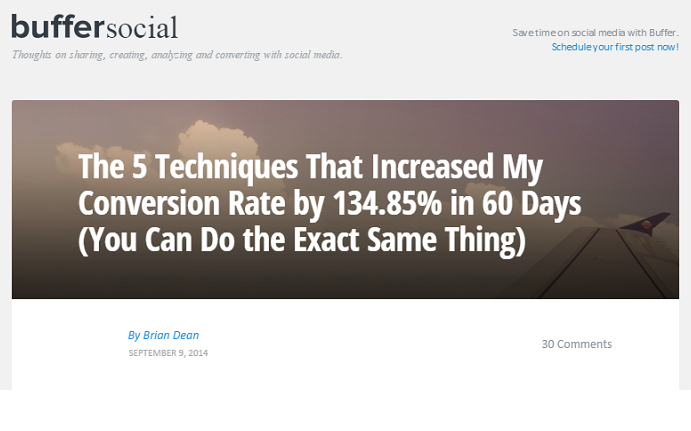 There are hundreds of blog posts that discuss guest blogging both in shallow and deep levels.
There are hundreds of blog posts that discuss guest blogging both in shallow and deep levels.
But one thing that lacks in almost all these articles is the idea of clicks.
Guest blogging is an effective branding strategy (as you all know) but it’s also a great traffic generation tool for blogs that don’t have much exposure in the industry, considering that quality information produced in guest posts would trigger its current visitors to follow the contributor’s blog – which should be main reason why you do guest blogging.
Let’s take Brian Dean’s guest post as a good example of this strategy.
There are many key strategies we can absorb from his guest blogging strategy, and here are some of them:
- Providing real life examples is better than just writing practical tips since these examples can easily nudge readers to apply the tips to their own daily activities because of the idea of proofs.
- Special bonus section could increase potentials of absorbing potential email subscribers from the blog – it’s a direct lead generation approach after the readers consume the post.
- Long form content triggers more active social sharing and amplification (distributing of one’s content from one platform to another).
Invest in creating at least one solid guest post every month with unexpected hooks pulled up in the post and see the results for yourself.
15. Create long tail data-based content
For most content marketers, creating a content packed up with data and credible sources is an expensive activity, since it will mostly require money to gather this information.
As more and more authority blogs are publishing expertly-made content, sourcing references for data-based content is now possible.
With Builtvisible’s Content Strategy Helper, this becomes more doable and can be used in any of the following methods:
- Consolidate trending topics from UK & US social networks, news sites and government data sources into one spreadsheet and validate topics that will best gain interest for your website.
- Create a list of bloggers/editors/influencers that are associated to specific search queries. This would initially give you opportunities for potential outreach/press coverage.
- Add credible references to your content in order to increase its credibility for readers/consumers.
Other useful resources you can check out:
- The Content Marketer’s Guide to Google Consumer Surveys
- Generate better content ideas
- 24 Untapped Ways to Get Ideas For Your Next Blog Post
If you are looking for a link building agency to partner with you, then don’t hesitate to contact us today.
The Author
Venchito Tampon Jr
Venchito Tampon is a Filipino Motivational Speaker, Corporate Trainer, and a Leadership Speaker in the Philippines. He is the CEO and Co-Founder of SharpRocket, a link building agency. With a decade of experience, Venchito has a proven track record of leading hundreds of successful SEO (link builidng) campaigns across competitive industries like finance, B2B, legal, and SaaS. His expert advice as a link building expert has been featured in renowned publications such as Semrush, Ahrefs, Huffington Post and Forbes. He is also an international SEO spoken and has delivered talks in SEO Zraz, Asia Pacific Affiliate Summit in Singapore, and Search Marketing Summit in Sydney, Australia. Check out his other businesses, Hills & Valleys Cafe, Blend N Sips and Saas Pursuit.
How our LINK BUILDING AGENCY builds 250 links/mo consistently using Predictable Link Building Methodology™…
- Using a SIMPLE and PROVEN system
- Using a SCALABLE strategy
- No private blog networks
- No creepy outreach emails
